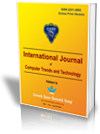Analyzing The Senior High School Students’ Learning Attitude And Cognition Toward Computer Science Education
 | International Journal of Computer Trends and Technology (IJCTT) |  |
| © - October Issue 2013 by IJCTT Journal | ||
| Volume-4 Issue-10 | ||
| Year of Publication : 2013 | ||
| Authors :Yu Hsin Hung |

Yu Hsin Hung "Analyzing The Senior High School Students’ Learning Attitude And Cognition Toward Computer Science Education"International Journal of Computer Trends and Technology (IJCTT),V4(10):3526-3529 October Issue 2013 .ISSN 2231-2803.www.ijcttjournal.org. Published by Seventh Sense Research Group.
Abstract:- Information technology have flourished, various types of computer- assisted system designed on our daily life, how they sustain system quality and affect the system performance are therefore essential for enterprises` operating capacity. Knowledge of computer science is considered as one of the core competencies, while technology systems have been widely applied in many industries. The need to cultivate the science knowledge is engaging learners’ attention in making practice. This paper reports a preliminary study that investigates the key factors affecting learning among senior high school student expect computer science education. The aim of this study was to assess the learning attitude toward computer science education, and the study also investigated the self-perception of leaner which based on the potential cognition load in the learning effectiveness and motivational appeal. The sample was 70 senior high school student students. The experimental results show that the participants have a 95% probability of requirement to learn the computer science knowledge which indicated that the student have learning interesting of computer science education. Data analyses showed that the student percept computer science knowledge is difficult. The results point that the senior high school student learning attitude and self-perception on the college computer science education, learners also provide the relevant suggestion on the purpose of making efficient college computer education.
References -
[1] K. M. Law, V. Lee, and Y. T. Yu, “Learning motivation in e-learning facilitated computer programming courses”, Computers & Education, vol. 55, no. 1, pp. 218-228, 2010.
[2] T. Jenkins, “The motivation of students of programming”, ACM SIGCSE Bulletin, vol. 33, no. 3, pp. 53-56, 2001.
[3] M. Papastergiou, “Digital Game-Based Learning in high school Computer Science education: Impact on educational effectiveness and student motivation”, Computers & Education, vol. 52, no. 1, pp.1-12, 2009.
[4] T. Jenkins, “The motivation of students of programming”, In Proceedings of ITiCSE 2001: The 6th annual conference on innovation and technology in computer science education, pp. 53–56, 2001.
[5] K. M. Y. Law, F. E. Sandnes, H. Jian, and Y. Huang,“A comparative study of learning motivation among engineering students in South East Asia and beyond”, International Journal of Engineering Education, vol. 25, no. 1, pp.144–151, 2009.
[6] W. W. F. Lau, and A. H. K. Yuen, “Exploring the effects of gender and learning styles on computer programming performance: Implications for programming pedagogy”, British Journal of Educational Technology, vol. 40, no.4, pp.696–712, 2009.
[7] L. Werner, J. Denner, M. Bliesner, and P. Rex, “Can middle-schoolers use Storytelling Alice to make games?: results of a pilot study”, InProceedings of the 4th International Conference on Foundations of Digital Games, pp. 207-214, ACM, April 2009.
[8] J. Denner, L. Werner, and E. Ortiz, “Computer games created by middle school girls: Can they be used to measure understanding of computer science concepts?” Computers & Education, vol. 58, no.1, pp. 240-249, 2012.
[9] C. Y.Feng, and M. P. Chen, “The effects of goal specificity and scaffolding on programming performance and self-regulation in game design”, British Journal of Educational Technology, 2013.
[10] E. A. Linnenbrink, and P. R. Pintrich, “Motivation as an enabler for academic success”, School Psychology Review, vol. 31, no.3, pp.313-327, 2002.
Keywords :— Learning attitude, computer science education, self-perception
